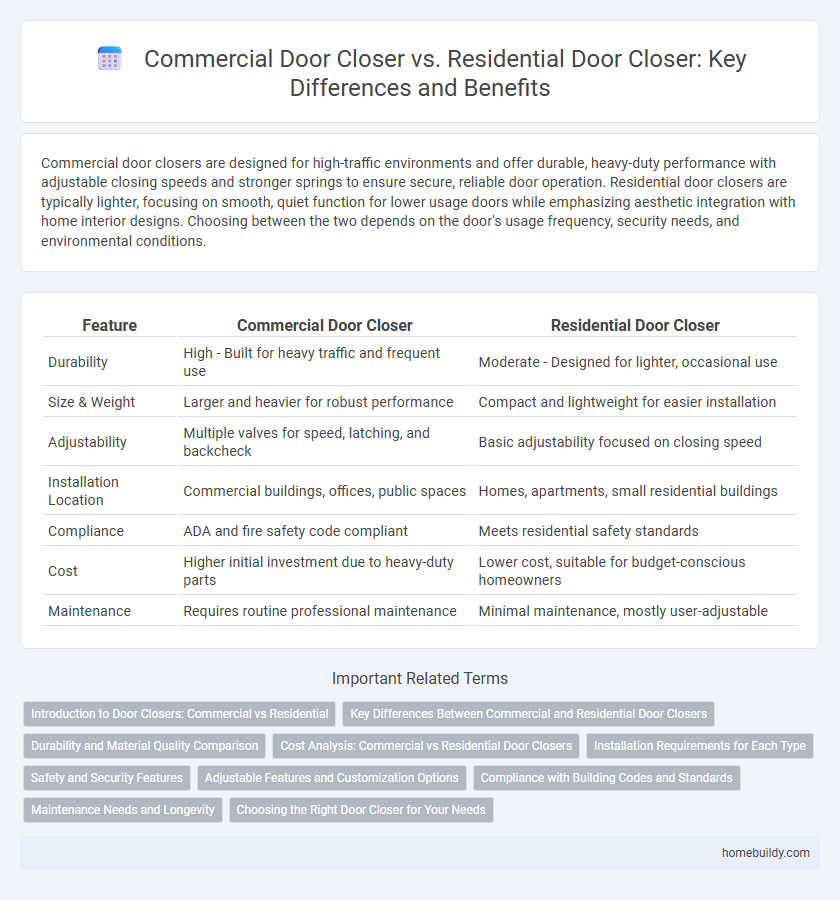Commercial door closers are designed for high-traffic environments and offer durable, heavy-duty performance with adjustable closing speeds and stronger springs to ensure secure, reliable door operation. Residential door closers are typically lighter, focusing on smooth, quiet function for lower usage doors while emphasizing aesthetic integration with home interior designs. Choosing between the two depends on the door's usage frequency, security needs, and environmental conditions.
Table of Comparison
| Feature | Commercial Door Closer | Residential Door Closer |
|---|---|---|
| Durability | High - Built for heavy traffic and frequent use | Moderate - Designed for lighter, occasional use |
| Size & Weight | Larger and heavier for robust performance | Compact and lightweight for easier installation |
| Adjustability | Multiple valves for speed, latching, and backcheck | Basic adjustability focused on closing speed |
| Installation Location | Commercial buildings, offices, public spaces | Homes, apartments, small residential buildings |
| Compliance | ADA and fire safety code compliant | Meets residential safety standards |
| Cost | Higher initial investment due to heavy-duty parts | Lower cost, suitable for budget-conscious homeowners |
| Maintenance | Requires routine professional maintenance | Minimal maintenance, mostly user-adjustable |
Introduction to Door Closers: Commercial vs Residential
Commercial door closers are designed for high-traffic environments, offering robust durability and adjustable closing force to meet safety codes and accessibility standards. Residential door closers prioritize smooth, quiet operation with less force, tailored for lighter use and enhanced convenience in homes. Both types ensure controlled door closing, but commercial models emphasize strength and compliance, while residential models focus on comfort and aesthetic integration.
Key Differences Between Commercial and Residential Door Closers
Commercial door closers are designed for high-traffic use, offering stronger closing force, durability, and compliance with ADA standards to handle frequent openings in public or business environments. Residential door closers prioritize quieter operation, aesthetic design, and moderate force suitable for lower traffic areas such as homes. The key difference lies in the commercial models' ability to withstand heavy usage and meet strict safety codes, while residential closers focus on ease of use and appearance.
Durability and Material Quality Comparison
Commercial door closers are engineered with heavy-duty materials such as hardened steel and reinforced alloys, ensuring superior durability under constant high-traffic use. Residential door closers typically utilize lighter metals like aluminum or zinc, which provide adequate strength for less frequent operation but may wear faster in demanding environments. The advanced material quality in commercial door closers supports extended service life and consistent performance compared to the more modest durability found in residential models.
Cost Analysis: Commercial vs Residential Door Closers
Commercial door closers typically cost between $150 and $400 due to heavy-duty materials and compliance with building codes, while residential door closers average around $50 to $150, reflecting lighter construction and simpler mechanisms. Installation expenses also differ, with commercial units requiring professional services costing $200 to $500, whereas residential installations are often less complex and can range from $100 to $250. Long-term maintenance and durability favor commercial door closers, as they are designed for high-frequency use, reducing replacement and repair costs compared to residential models.
Installation Requirements for Each Type
Commercial door closers typically require more robust installation due to higher traffic volume and heavier door materials, often necessitating reinforced frames and specialized mounting brackets. Residential door closers, designed for lighter doors and less frequent use, usually have simpler installation processes that involve standard screws and minimal adjustments. Proper installation for each type ensures optimal performance, safety, and compliance with building codes specific to commercial or residential settings.
Safety and Security Features
Commercial door closers are engineered with robust safety and security features such as heavy-duty materials, adjustable closing speeds, and integrated delayed action functions to accommodate high-traffic environments. Residential door closers prioritize ease of use with features like controlled closing strength and quiet operation, while still providing essential security elements including tamper-resistant covers and compliance with fire safety standards. Both types often incorporate anti-bacterial coatings and backcheck functions to enhance user safety and prevent door damage.
Adjustable Features and Customization Options
Commercial door closers offer extensive adjustable features such as variable closing speed, latching speed, and backcheck resistance to accommodate heavy traffic and safety regulations. Residential door closers typically have fewer customization options, focusing primarily on basic tension adjustments for lighter doors. The enhanced customization of commercial models ensures optimal performance in diverse environments, meeting specific operational and security requirements.
Compliance with Building Codes and Standards
Commercial door closers adhere strictly to ADA (Americans with Disabilities Act) regulations and fire safety codes such as UL 10C, ensuring accessibility and safety in public buildings. Residential door closers, while meeting basic safety standards, typically follow less rigorous guidelines like ANSI/BHMA A156.4, focusing on ease of use and home security. Compliance with these specific building codes and standards is crucial for legal installation and optimal performance in each environment.
Maintenance Needs and Longevity
Commercial door closers require regular maintenance including lubrication, adjustment, and inspection due to high-frequency use and heavier door weights, ensuring optimal performance and extending lifespan. Residential door closers experience less wear and typically need minimal upkeep, often limited to occasional cleaning and minor adjustments. The robust construction and advanced mechanisms of commercial door closers generally provide longer longevity compared to residential models under continuous heavy use conditions.
Choosing the Right Door Closer for Your Needs
Commercial door closers are designed to withstand high traffic and heavy use, featuring durable materials and stronger closing forces to ensure safety and security in public spaces. Residential door closers prioritize quieter operation and aesthetic integration, with adjustable tension settings suitable for lower traffic volumes. Selecting the appropriate door closer depends on factors like door weight, frequency of use, and compliance with building codes, ensuring optimal performance and longevity.
commercial door closer vs residential door closer Infographic

 homebuildy.com
homebuildy.com